UN Financial Challenges: Donor Influence and Satisfaction Research
VerifiedAdded on 2020/06/04
|12
|3840
|483
Report
AI Summary
This research report investigates the financial challenges faced by the United Nations, focusing on the factors influencing donor decisions and the impact of their satisfaction levels on contributions. The study begins with an overview of the organizational problem, identifying the financial difficulties stemming from insufficient funding and the failure of member states to meet their financial obligations. A literature review explores the UN's funding mechanisms, marketing strategies to attract donors, and a comparison of its competitiveness with non-governmental organizations. The research proposes a statement, objectives, and research questions, along with the use of qualitative tools, specifically interviews with 15 reporters, to gather data. The research plan details the issues to be explored, recommendations for the interview process, sampling methods, interview locations, data analysis techniques, ethical considerations, and a time frame for completion. The research aims to provide recommendations to address the UN's financial crisis.
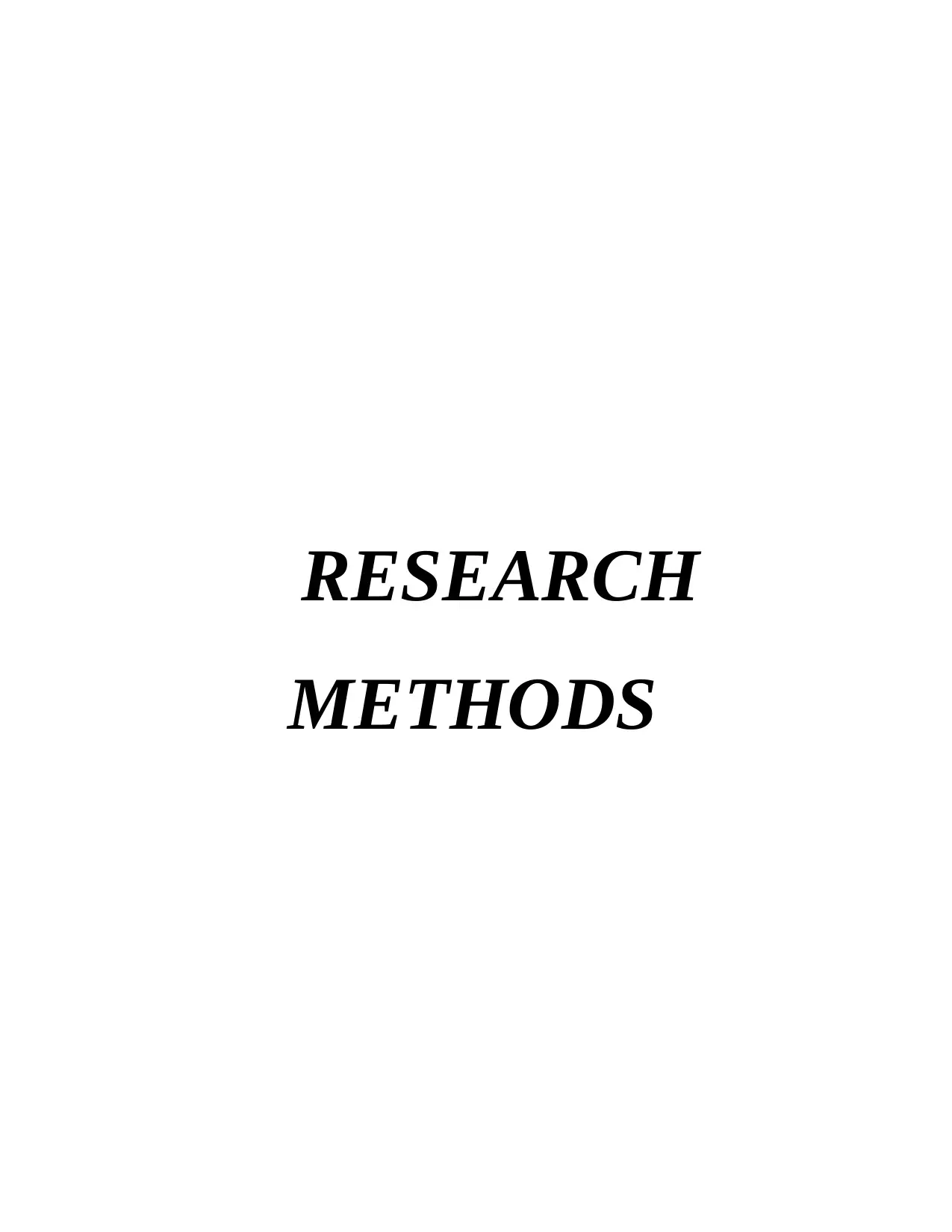
RESEARCH
METHODS
METHODS
Paraphrase This Document
Need a fresh take? Get an instant paraphrase of this document with our AI Paraphraser
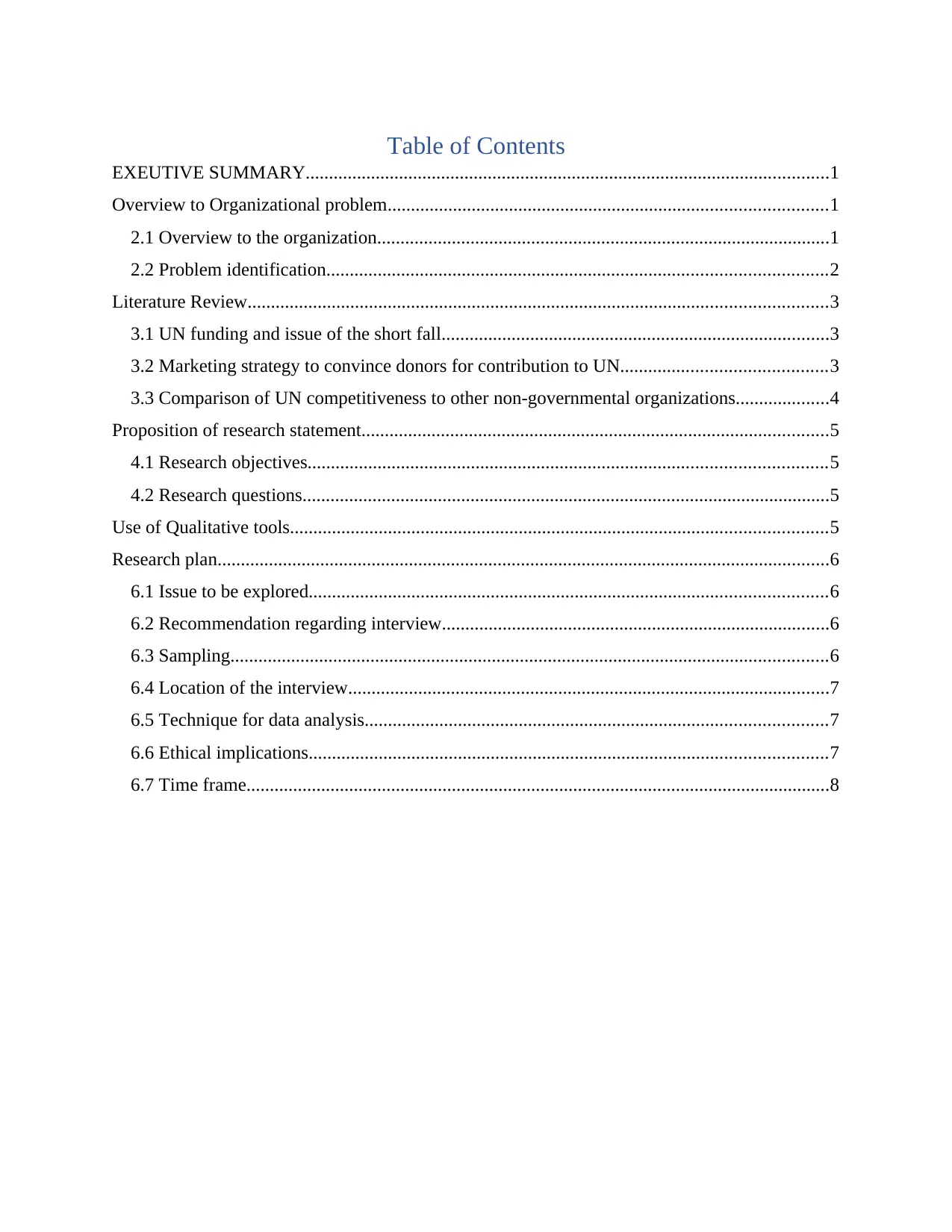
Table of Contents
EXEUTIVE SUMMARY................................................................................................................1
Overview to Organizational problem..............................................................................................1
2.1 Overview to the organization.................................................................................................1
2.2 Problem identification...........................................................................................................2
Literature Review............................................................................................................................3
3.1 UN funding and issue of the short fall...................................................................................3
3.2 Marketing strategy to convince donors for contribution to UN............................................3
3.3 Comparison of UN competitiveness to other non-governmental organizations....................4
Proposition of research statement....................................................................................................5
4.1 Research objectives...............................................................................................................5
4.2 Research questions.................................................................................................................5
Use of Qualitative tools...................................................................................................................5
Research plan...................................................................................................................................6
6.1 Issue to be explored...............................................................................................................6
6.2 Recommendation regarding interview...................................................................................6
6.3 Sampling................................................................................................................................6
6.4 Location of the interview.......................................................................................................7
6.5 Technique for data analysis...................................................................................................7
6.6 Ethical implications...............................................................................................................7
6.7 Time frame.............................................................................................................................8
EXEUTIVE SUMMARY................................................................................................................1
Overview to Organizational problem..............................................................................................1
2.1 Overview to the organization.................................................................................................1
2.2 Problem identification...........................................................................................................2
Literature Review............................................................................................................................3
3.1 UN funding and issue of the short fall...................................................................................3
3.2 Marketing strategy to convince donors for contribution to UN............................................3
3.3 Comparison of UN competitiveness to other non-governmental organizations....................4
Proposition of research statement....................................................................................................5
4.1 Research objectives...............................................................................................................5
4.2 Research questions.................................................................................................................5
Use of Qualitative tools...................................................................................................................5
Research plan...................................................................................................................................6
6.1 Issue to be explored...............................................................................................................6
6.2 Recommendation regarding interview...................................................................................6
6.3 Sampling................................................................................................................................6
6.4 Location of the interview.......................................................................................................7
6.5 Technique for data analysis...................................................................................................7
6.6 Ethical implications...............................................................................................................7
6.7 Time frame.............................................................................................................................8
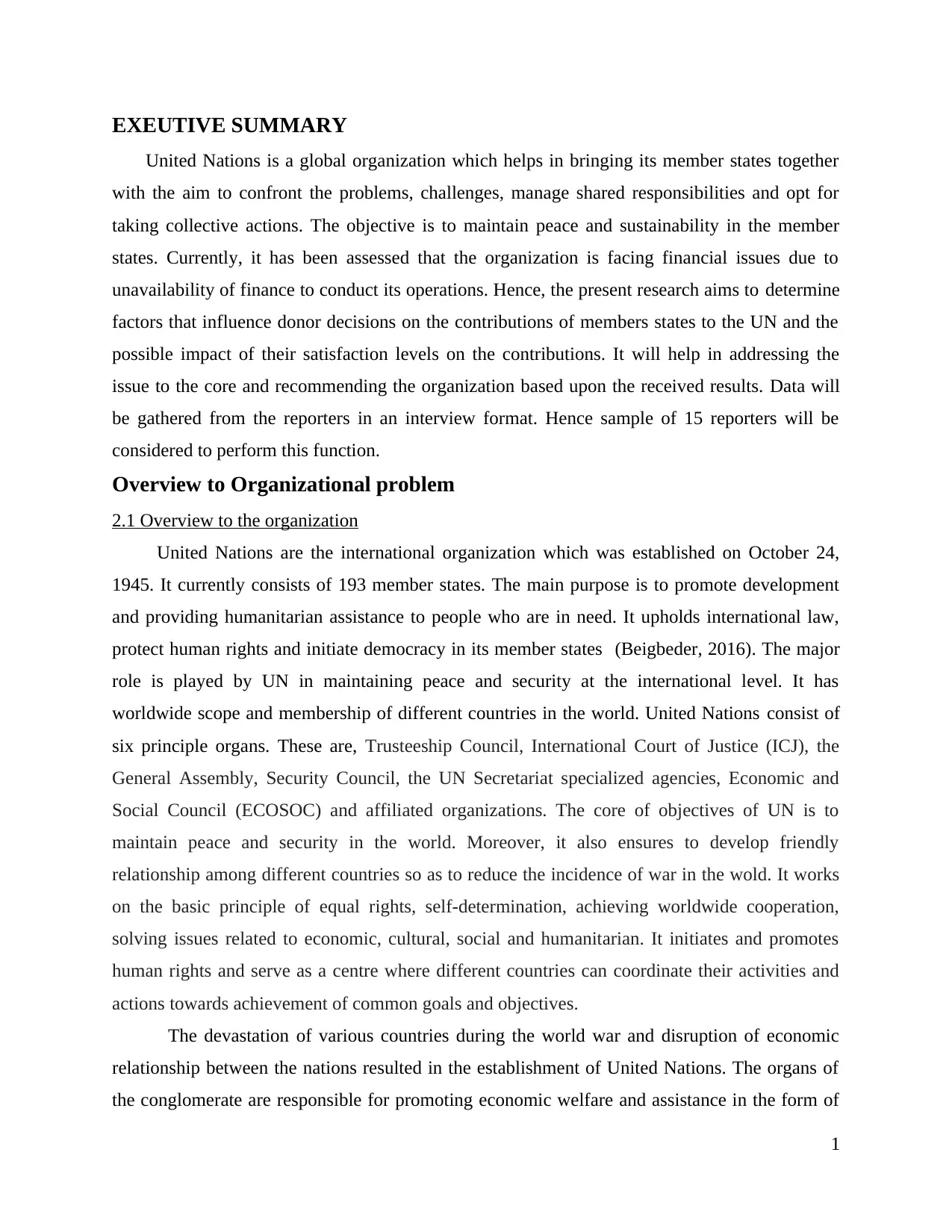
EXEUTIVE SUMMARY
United Nations is a global organization which helps in bringing its member states together
with the aim to confront the problems, challenges, manage shared responsibilities and opt for
taking collective actions. The objective is to maintain peace and sustainability in the member
states. Currently, it has been assessed that the organization is facing financial issues due to
unavailability of finance to conduct its operations. Hence, the present research aims to determine
factors that influence donor decisions on the contributions of members states to the UN and the
possible impact of their satisfaction levels on the contributions. It will help in addressing the
issue to the core and recommending the organization based upon the received results. Data will
be gathered from the reporters in an interview format. Hence sample of 15 reporters will be
considered to perform this function.
Overview to Organizational problem
2.1 Overview to the organization
United Nations are the international organization which was established on October 24,
1945. It currently consists of 193 member states. The main purpose is to promote development
and providing humanitarian assistance to people who are in need. It upholds international law,
protect human rights and initiate democracy in its member states (Beigbeder, 2016). The major
role is played by UN in maintaining peace and security at the international level. It has
worldwide scope and membership of different countries in the world. United Nations consist of
six principle organs. These are, Trusteeship Council, International Court of Justice (ICJ), the
General Assembly, Security Council, the UN Secretariat specialized agencies, Economic and
Social Council (ECOSOC) and affiliated organizations. The core of objectives of UN is to
maintain peace and security in the world. Moreover, it also ensures to develop friendly
relationship among different countries so as to reduce the incidence of war in the wold. It works
on the basic principle of equal rights, self-determination, achieving worldwide cooperation,
solving issues related to economic, cultural, social and humanitarian. It initiates and promotes
human rights and serve as a centre where different countries can coordinate their activities and
actions towards achievement of common goals and objectives.
The devastation of various countries during the world war and disruption of economic
relationship between the nations resulted in the establishment of United Nations. The organs of
the conglomerate are responsible for promoting economic welfare and assistance in the form of
1
United Nations is a global organization which helps in bringing its member states together
with the aim to confront the problems, challenges, manage shared responsibilities and opt for
taking collective actions. The objective is to maintain peace and sustainability in the member
states. Currently, it has been assessed that the organization is facing financial issues due to
unavailability of finance to conduct its operations. Hence, the present research aims to determine
factors that influence donor decisions on the contributions of members states to the UN and the
possible impact of their satisfaction levels on the contributions. It will help in addressing the
issue to the core and recommending the organization based upon the received results. Data will
be gathered from the reporters in an interview format. Hence sample of 15 reporters will be
considered to perform this function.
Overview to Organizational problem
2.1 Overview to the organization
United Nations are the international organization which was established on October 24,
1945. It currently consists of 193 member states. The main purpose is to promote development
and providing humanitarian assistance to people who are in need. It upholds international law,
protect human rights and initiate democracy in its member states (Beigbeder, 2016). The major
role is played by UN in maintaining peace and security at the international level. It has
worldwide scope and membership of different countries in the world. United Nations consist of
six principle organs. These are, Trusteeship Council, International Court of Justice (ICJ), the
General Assembly, Security Council, the UN Secretariat specialized agencies, Economic and
Social Council (ECOSOC) and affiliated organizations. The core of objectives of UN is to
maintain peace and security in the world. Moreover, it also ensures to develop friendly
relationship among different countries so as to reduce the incidence of war in the wold. It works
on the basic principle of equal rights, self-determination, achieving worldwide cooperation,
solving issues related to economic, cultural, social and humanitarian. It initiates and promotes
human rights and serve as a centre where different countries can coordinate their activities and
actions towards achievement of common goals and objectives.
The devastation of various countries during the world war and disruption of economic
relationship between the nations resulted in the establishment of United Nations. The organs of
the conglomerate are responsible for promoting economic welfare and assistance in the form of
1
⊘ This is a preview!⊘
Do you want full access?
Subscribe today to unlock all pages.

Trusted by 1+ million students worldwide
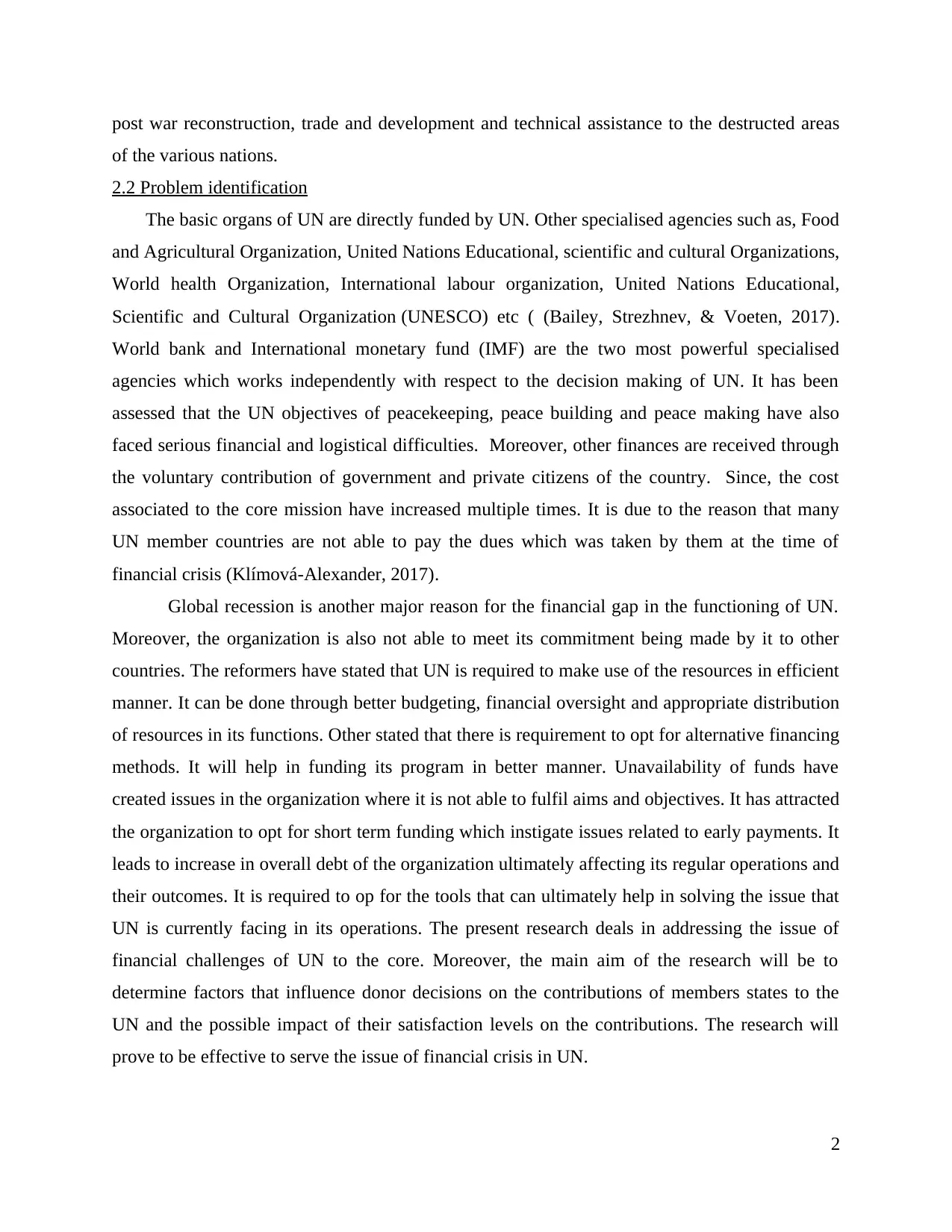
post war reconstruction, trade and development and technical assistance to the destructed areas
of the various nations.
2.2 Problem identification
The basic organs of UN are directly funded by UN. Other specialised agencies such as, Food
and Agricultural Organization, United Nations Educational, scientific and cultural Organizations,
World health Organization, International labour organization, United Nations Educational,
Scientific and Cultural Organization (UNESCO) etc ( (Bailey, Strezhnev, & Voeten, 2017).
World bank and International monetary fund (IMF) are the two most powerful specialised
agencies which works independently with respect to the decision making of UN. It has been
assessed that the UN objectives of peacekeeping, peace building and peace making have also
faced serious financial and logistical difficulties. Moreover, other finances are received through
the voluntary contribution of government and private citizens of the country. Since, the cost
associated to the core mission have increased multiple times. It is due to the reason that many
UN member countries are not able to pay the dues which was taken by them at the time of
financial crisis (Klímová-Alexander, 2017).
Global recession is another major reason for the financial gap in the functioning of UN.
Moreover, the organization is also not able to meet its commitment being made by it to other
countries. The reformers have stated that UN is required to make use of the resources in efficient
manner. It can be done through better budgeting, financial oversight and appropriate distribution
of resources in its functions. Other stated that there is requirement to opt for alternative financing
methods. It will help in funding its program in better manner. Unavailability of funds have
created issues in the organization where it is not able to fulfil aims and objectives. It has attracted
the organization to opt for short term funding which instigate issues related to early payments. It
leads to increase in overall debt of the organization ultimately affecting its regular operations and
their outcomes. It is required to op for the tools that can ultimately help in solving the issue that
UN is currently facing in its operations. The present research deals in addressing the issue of
financial challenges of UN to the core. Moreover, the main aim of the research will be to
determine factors that influence donor decisions on the contributions of members states to the
UN and the possible impact of their satisfaction levels on the contributions. The research will
prove to be effective to serve the issue of financial crisis in UN.
2
of the various nations.
2.2 Problem identification
The basic organs of UN are directly funded by UN. Other specialised agencies such as, Food
and Agricultural Organization, United Nations Educational, scientific and cultural Organizations,
World health Organization, International labour organization, United Nations Educational,
Scientific and Cultural Organization (UNESCO) etc ( (Bailey, Strezhnev, & Voeten, 2017).
World bank and International monetary fund (IMF) are the two most powerful specialised
agencies which works independently with respect to the decision making of UN. It has been
assessed that the UN objectives of peacekeeping, peace building and peace making have also
faced serious financial and logistical difficulties. Moreover, other finances are received through
the voluntary contribution of government and private citizens of the country. Since, the cost
associated to the core mission have increased multiple times. It is due to the reason that many
UN member countries are not able to pay the dues which was taken by them at the time of
financial crisis (Klímová-Alexander, 2017).
Global recession is another major reason for the financial gap in the functioning of UN.
Moreover, the organization is also not able to meet its commitment being made by it to other
countries. The reformers have stated that UN is required to make use of the resources in efficient
manner. It can be done through better budgeting, financial oversight and appropriate distribution
of resources in its functions. Other stated that there is requirement to opt for alternative financing
methods. It will help in funding its program in better manner. Unavailability of funds have
created issues in the organization where it is not able to fulfil aims and objectives. It has attracted
the organization to opt for short term funding which instigate issues related to early payments. It
leads to increase in overall debt of the organization ultimately affecting its regular operations and
their outcomes. It is required to op for the tools that can ultimately help in solving the issue that
UN is currently facing in its operations. The present research deals in addressing the issue of
financial challenges of UN to the core. Moreover, the main aim of the research will be to
determine factors that influence donor decisions on the contributions of members states to the
UN and the possible impact of their satisfaction levels on the contributions. The research will
prove to be effective to serve the issue of financial crisis in UN.
2
Paraphrase This Document
Need a fresh take? Get an instant paraphrase of this document with our AI Paraphraser
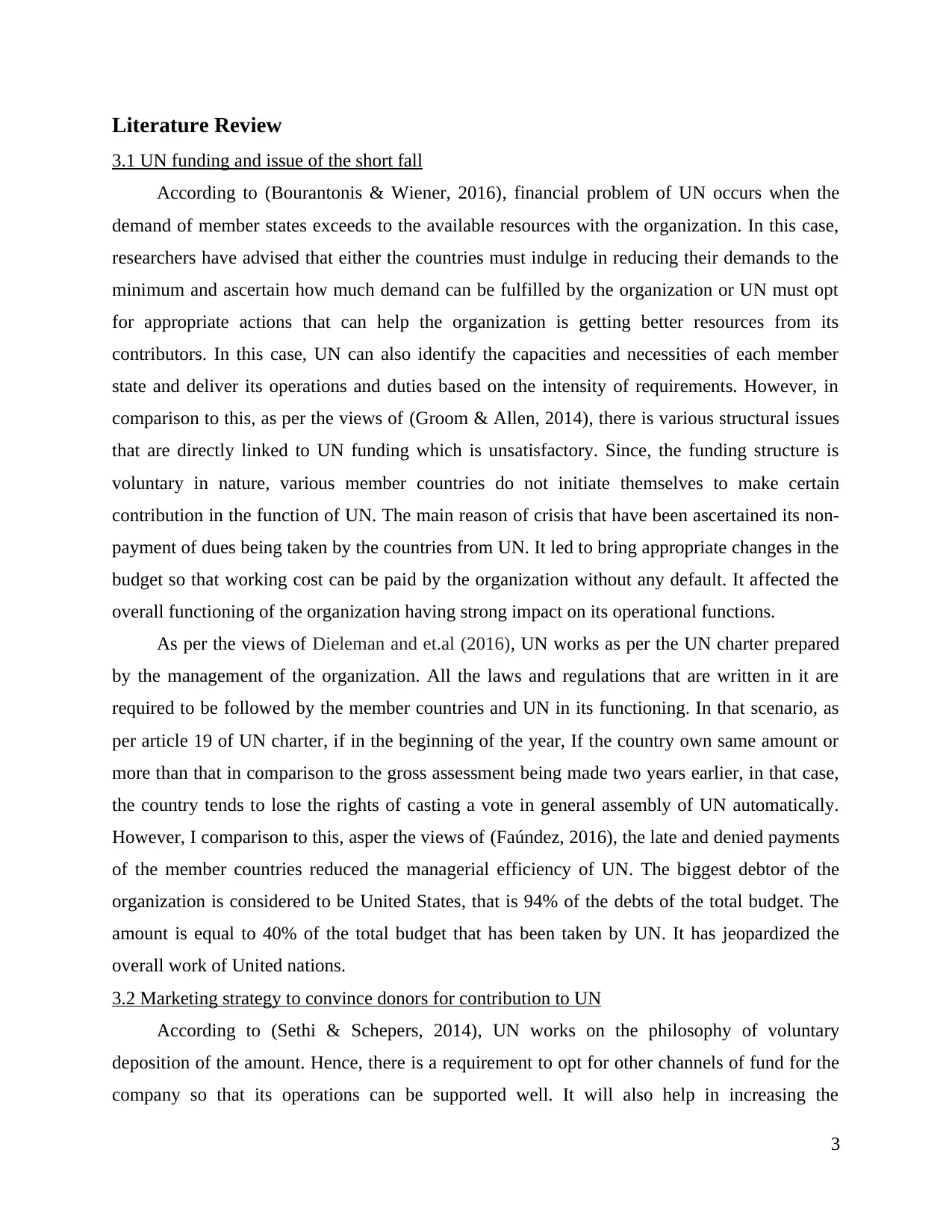
Literature Review
3.1 UN funding and issue of the short fall
According to (Bourantonis & Wiener, 2016), financial problem of UN occurs when the
demand of member states exceeds to the available resources with the organization. In this case,
researchers have advised that either the countries must indulge in reducing their demands to the
minimum and ascertain how much demand can be fulfilled by the organization or UN must opt
for appropriate actions that can help the organization is getting better resources from its
contributors. In this case, UN can also identify the capacities and necessities of each member
state and deliver its operations and duties based on the intensity of requirements. However, in
comparison to this, as per the views of (Groom & Allen, 2014), there is various structural issues
that are directly linked to UN funding which is unsatisfactory. Since, the funding structure is
voluntary in nature, various member countries do not initiate themselves to make certain
contribution in the function of UN. The main reason of crisis that have been ascertained its non-
payment of dues being taken by the countries from UN. It led to bring appropriate changes in the
budget so that working cost can be paid by the organization without any default. It affected the
overall functioning of the organization having strong impact on its operational functions.
As per the views of Dieleman and et.al (2016), UN works as per the UN charter prepared
by the management of the organization. All the laws and regulations that are written in it are
required to be followed by the member countries and UN in its functioning. In that scenario, as
per article 19 of UN charter, if in the beginning of the year, If the country own same amount or
more than that in comparison to the gross assessment being made two years earlier, in that case,
the country tends to lose the rights of casting a vote in general assembly of UN automatically.
However, I comparison to this, asper the views of (Faúndez, 2016), the late and denied payments
of the member countries reduced the managerial efficiency of UN. The biggest debtor of the
organization is considered to be United States, that is 94% of the debts of the total budget. The
amount is equal to 40% of the total budget that has been taken by UN. It has jeopardized the
overall work of United nations.
3.2 Marketing strategy to convince donors for contribution to UN
According to (Sethi & Schepers, 2014), UN works on the philosophy of voluntary
deposition of the amount. Hence, there is a requirement to opt for other channels of fund for the
company so that its operations can be supported well. It will also help in increasing the
3
3.1 UN funding and issue of the short fall
According to (Bourantonis & Wiener, 2016), financial problem of UN occurs when the
demand of member states exceeds to the available resources with the organization. In this case,
researchers have advised that either the countries must indulge in reducing their demands to the
minimum and ascertain how much demand can be fulfilled by the organization or UN must opt
for appropriate actions that can help the organization is getting better resources from its
contributors. In this case, UN can also identify the capacities and necessities of each member
state and deliver its operations and duties based on the intensity of requirements. However, in
comparison to this, as per the views of (Groom & Allen, 2014), there is various structural issues
that are directly linked to UN funding which is unsatisfactory. Since, the funding structure is
voluntary in nature, various member countries do not initiate themselves to make certain
contribution in the function of UN. The main reason of crisis that have been ascertained its non-
payment of dues being taken by the countries from UN. It led to bring appropriate changes in the
budget so that working cost can be paid by the organization without any default. It affected the
overall functioning of the organization having strong impact on its operational functions.
As per the views of Dieleman and et.al (2016), UN works as per the UN charter prepared
by the management of the organization. All the laws and regulations that are written in it are
required to be followed by the member countries and UN in its functioning. In that scenario, as
per article 19 of UN charter, if in the beginning of the year, If the country own same amount or
more than that in comparison to the gross assessment being made two years earlier, in that case,
the country tends to lose the rights of casting a vote in general assembly of UN automatically.
However, I comparison to this, asper the views of (Faúndez, 2016), the late and denied payments
of the member countries reduced the managerial efficiency of UN. The biggest debtor of the
organization is considered to be United States, that is 94% of the debts of the total budget. The
amount is equal to 40% of the total budget that has been taken by UN. It has jeopardized the
overall work of United nations.
3.2 Marketing strategy to convince donors for contribution to UN
According to (Sethi & Schepers, 2014), UN works on the philosophy of voluntary
deposition of the amount. Hence, there is a requirement to opt for other channels of fund for the
company so that its operations can be supported well. It will also help in increasing the
3
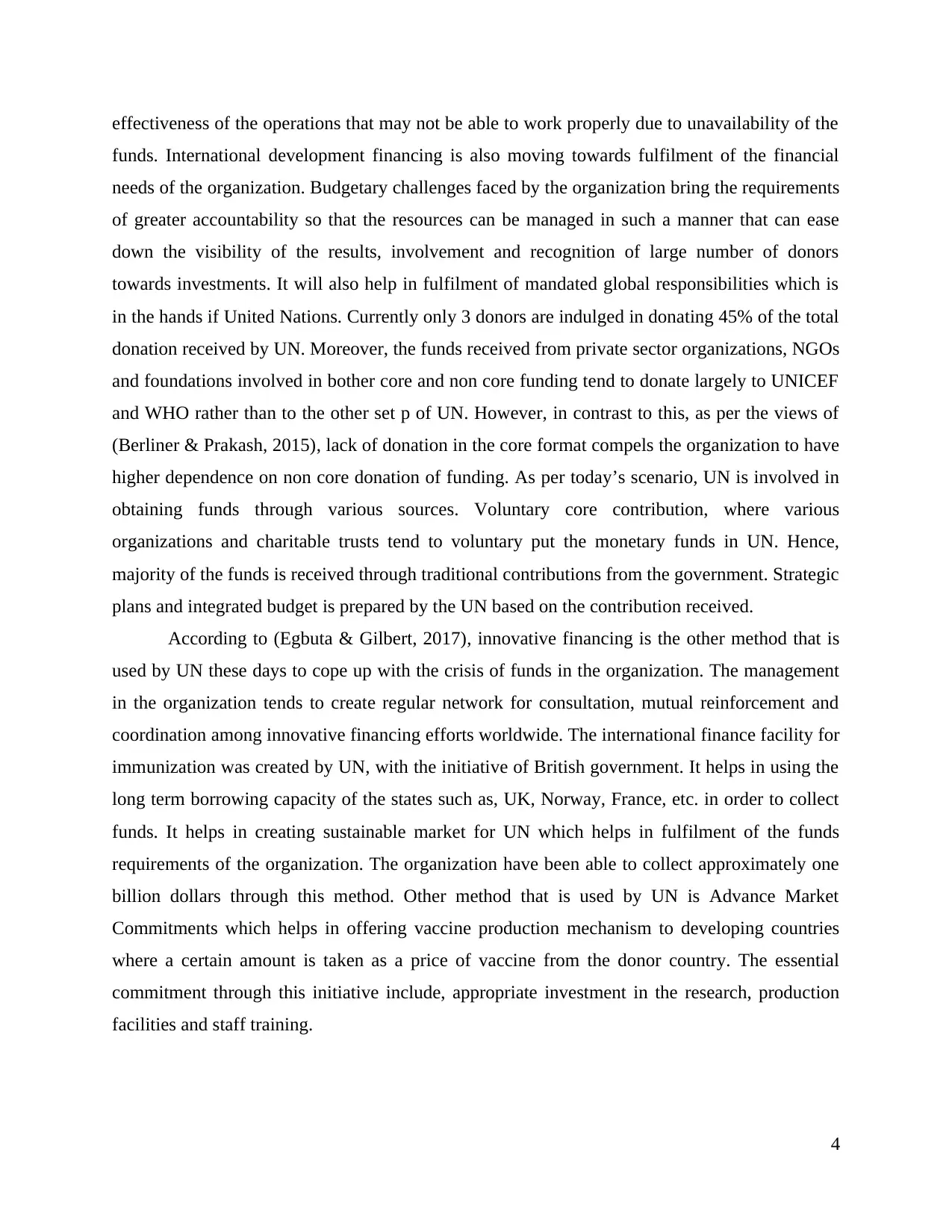
effectiveness of the operations that may not be able to work properly due to unavailability of the
funds. International development financing is also moving towards fulfilment of the financial
needs of the organization. Budgetary challenges faced by the organization bring the requirements
of greater accountability so that the resources can be managed in such a manner that can ease
down the visibility of the results, involvement and recognition of large number of donors
towards investments. It will also help in fulfilment of mandated global responsibilities which is
in the hands if United Nations. Currently only 3 donors are indulged in donating 45% of the total
donation received by UN. Moreover, the funds received from private sector organizations, NGOs
and foundations involved in bother core and non core funding tend to donate largely to UNICEF
and WHO rather than to the other set p of UN. However, in contrast to this, as per the views of
(Berliner & Prakash, 2015), lack of donation in the core format compels the organization to have
higher dependence on non core donation of funding. As per today’s scenario, UN is involved in
obtaining funds through various sources. Voluntary core contribution, where various
organizations and charitable trusts tend to voluntary put the monetary funds in UN. Hence,
majority of the funds is received through traditional contributions from the government. Strategic
plans and integrated budget is prepared by the UN based on the contribution received.
According to (Egbuta & Gilbert, 2017), innovative financing is the other method that is
used by UN these days to cope up with the crisis of funds in the organization. The management
in the organization tends to create regular network for consultation, mutual reinforcement and
coordination among innovative financing efforts worldwide. The international finance facility for
immunization was created by UN, with the initiative of British government. It helps in using the
long term borrowing capacity of the states such as, UK, Norway, France, etc. in order to collect
funds. It helps in creating sustainable market for UN which helps in fulfilment of the funds
requirements of the organization. The organization have been able to collect approximately one
billion dollars through this method. Other method that is used by UN is Advance Market
Commitments which helps in offering vaccine production mechanism to developing countries
where a certain amount is taken as a price of vaccine from the donor country. The essential
commitment through this initiative include, appropriate investment in the research, production
facilities and staff training.
4
funds. International development financing is also moving towards fulfilment of the financial
needs of the organization. Budgetary challenges faced by the organization bring the requirements
of greater accountability so that the resources can be managed in such a manner that can ease
down the visibility of the results, involvement and recognition of large number of donors
towards investments. It will also help in fulfilment of mandated global responsibilities which is
in the hands if United Nations. Currently only 3 donors are indulged in donating 45% of the total
donation received by UN. Moreover, the funds received from private sector organizations, NGOs
and foundations involved in bother core and non core funding tend to donate largely to UNICEF
and WHO rather than to the other set p of UN. However, in contrast to this, as per the views of
(Berliner & Prakash, 2015), lack of donation in the core format compels the organization to have
higher dependence on non core donation of funding. As per today’s scenario, UN is involved in
obtaining funds through various sources. Voluntary core contribution, where various
organizations and charitable trusts tend to voluntary put the monetary funds in UN. Hence,
majority of the funds is received through traditional contributions from the government. Strategic
plans and integrated budget is prepared by the UN based on the contribution received.
According to (Egbuta & Gilbert, 2017), innovative financing is the other method that is
used by UN these days to cope up with the crisis of funds in the organization. The management
in the organization tends to create regular network for consultation, mutual reinforcement and
coordination among innovative financing efforts worldwide. The international finance facility for
immunization was created by UN, with the initiative of British government. It helps in using the
long term borrowing capacity of the states such as, UK, Norway, France, etc. in order to collect
funds. It helps in creating sustainable market for UN which helps in fulfilment of the funds
requirements of the organization. The organization have been able to collect approximately one
billion dollars through this method. Other method that is used by UN is Advance Market
Commitments which helps in offering vaccine production mechanism to developing countries
where a certain amount is taken as a price of vaccine from the donor country. The essential
commitment through this initiative include, appropriate investment in the research, production
facilities and staff training.
4
⊘ This is a preview!⊘
Do you want full access?
Subscribe today to unlock all pages.

Trusted by 1+ million students worldwide
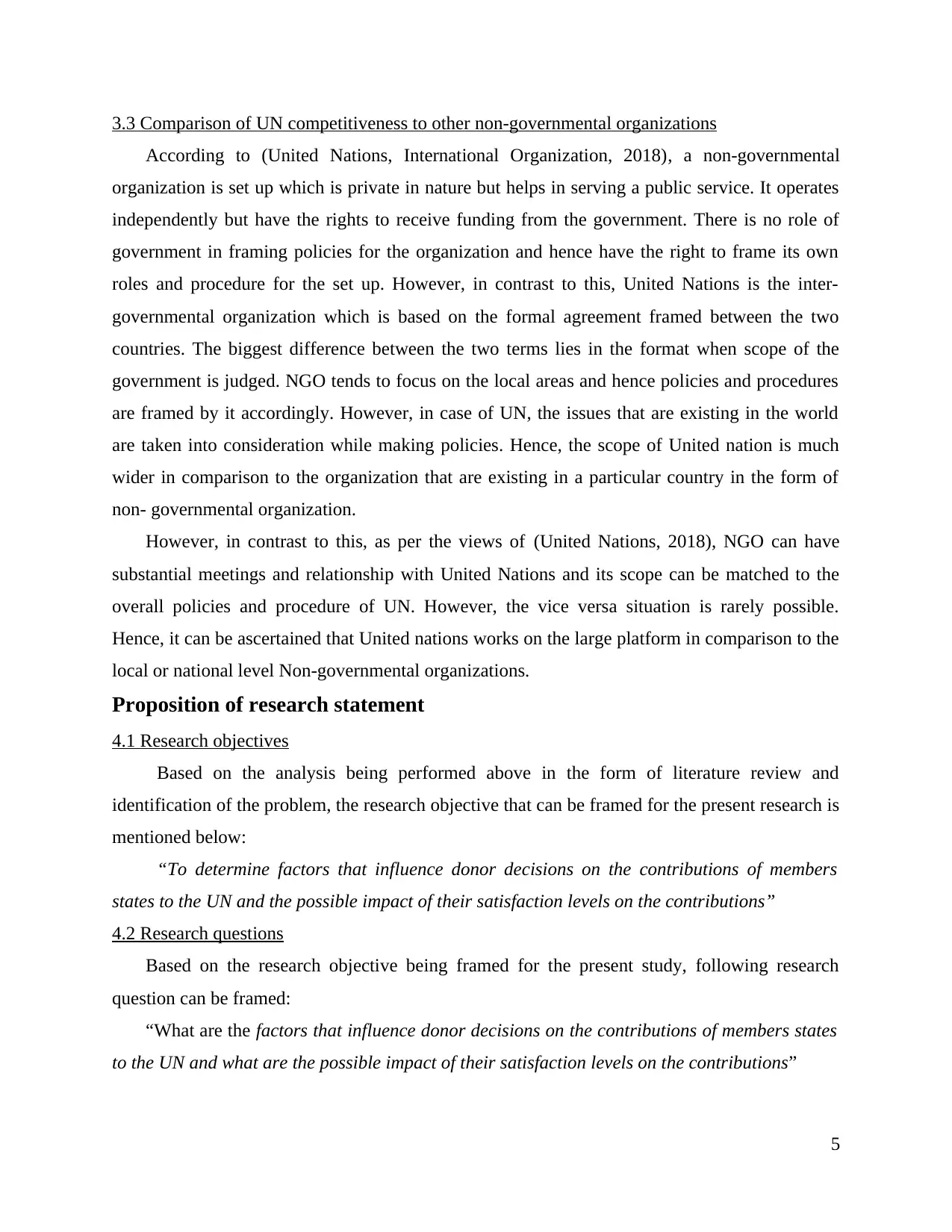
3.3 Comparison of UN competitiveness to other non-governmental organizations
According to (United Nations, International Organization, 2018), a non-governmental
organization is set up which is private in nature but helps in serving a public service. It operates
independently but have the rights to receive funding from the government. There is no role of
government in framing policies for the organization and hence have the right to frame its own
roles and procedure for the set up. However, in contrast to this, United Nations is the inter-
governmental organization which is based on the formal agreement framed between the two
countries. The biggest difference between the two terms lies in the format when scope of the
government is judged. NGO tends to focus on the local areas and hence policies and procedures
are framed by it accordingly. However, in case of UN, the issues that are existing in the world
are taken into consideration while making policies. Hence, the scope of United nation is much
wider in comparison to the organization that are existing in a particular country in the form of
non- governmental organization.
However, in contrast to this, as per the views of (United Nations, 2018), NGO can have
substantial meetings and relationship with United Nations and its scope can be matched to the
overall policies and procedure of UN. However, the vice versa situation is rarely possible.
Hence, it can be ascertained that United nations works on the large platform in comparison to the
local or national level Non-governmental organizations.
Proposition of research statement
4.1 Research objectives
Based on the analysis being performed above in the form of literature review and
identification of the problem, the research objective that can be framed for the present research is
mentioned below:
“To determine factors that influence donor decisions on the contributions of members
states to the UN and the possible impact of their satisfaction levels on the contributions”
4.2 Research questions
Based on the research objective being framed for the present study, following research
question can be framed:
“What are the factors that influence donor decisions on the contributions of members states
to the UN and what are the possible impact of their satisfaction levels on the contributions”
5
According to (United Nations, International Organization, 2018), a non-governmental
organization is set up which is private in nature but helps in serving a public service. It operates
independently but have the rights to receive funding from the government. There is no role of
government in framing policies for the organization and hence have the right to frame its own
roles and procedure for the set up. However, in contrast to this, United Nations is the inter-
governmental organization which is based on the formal agreement framed between the two
countries. The biggest difference between the two terms lies in the format when scope of the
government is judged. NGO tends to focus on the local areas and hence policies and procedures
are framed by it accordingly. However, in case of UN, the issues that are existing in the world
are taken into consideration while making policies. Hence, the scope of United nation is much
wider in comparison to the organization that are existing in a particular country in the form of
non- governmental organization.
However, in contrast to this, as per the views of (United Nations, 2018), NGO can have
substantial meetings and relationship with United Nations and its scope can be matched to the
overall policies and procedure of UN. However, the vice versa situation is rarely possible.
Hence, it can be ascertained that United nations works on the large platform in comparison to the
local or national level Non-governmental organizations.
Proposition of research statement
4.1 Research objectives
Based on the analysis being performed above in the form of literature review and
identification of the problem, the research objective that can be framed for the present research is
mentioned below:
“To determine factors that influence donor decisions on the contributions of members
states to the UN and the possible impact of their satisfaction levels on the contributions”
4.2 Research questions
Based on the research objective being framed for the present study, following research
question can be framed:
“What are the factors that influence donor decisions on the contributions of members states
to the UN and what are the possible impact of their satisfaction levels on the contributions”
5
Paraphrase This Document
Need a fresh take? Get an instant paraphrase of this document with our AI Paraphraser
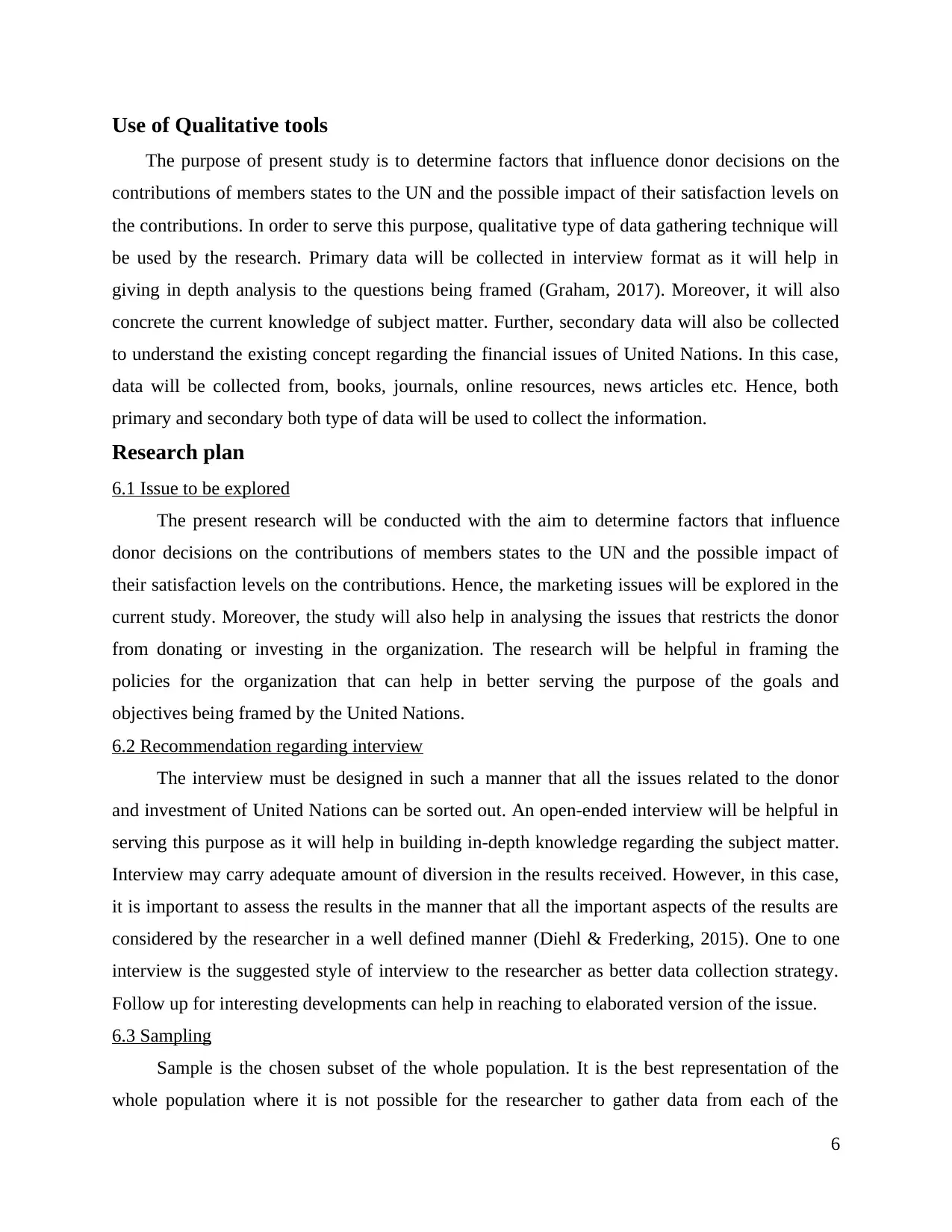
Use of Qualitative tools
The purpose of present study is to determine factors that influence donor decisions on the
contributions of members states to the UN and the possible impact of their satisfaction levels on
the contributions. In order to serve this purpose, qualitative type of data gathering technique will
be used by the research. Primary data will be collected in interview format as it will help in
giving in depth analysis to the questions being framed (Graham, 2017). Moreover, it will also
concrete the current knowledge of subject matter. Further, secondary data will also be collected
to understand the existing concept regarding the financial issues of United Nations. In this case,
data will be collected from, books, journals, online resources, news articles etc. Hence, both
primary and secondary both type of data will be used to collect the information.
Research plan
6.1 Issue to be explored
The present research will be conducted with the aim to determine factors that influence
donor decisions on the contributions of members states to the UN and the possible impact of
their satisfaction levels on the contributions. Hence, the marketing issues will be explored in the
current study. Moreover, the study will also help in analysing the issues that restricts the donor
from donating or investing in the organization. The research will be helpful in framing the
policies for the organization that can help in better serving the purpose of the goals and
objectives being framed by the United Nations.
6.2 Recommendation regarding interview
The interview must be designed in such a manner that all the issues related to the donor
and investment of United Nations can be sorted out. An open-ended interview will be helpful in
serving this purpose as it will help in building in-depth knowledge regarding the subject matter.
Interview may carry adequate amount of diversion in the results received. However, in this case,
it is important to assess the results in the manner that all the important aspects of the results are
considered by the researcher in a well defined manner (Diehl & Frederking, 2015). One to one
interview is the suggested style of interview to the researcher as better data collection strategy.
Follow up for interesting developments can help in reaching to elaborated version of the issue.
6.3 Sampling
Sample is the chosen subset of the whole population. It is the best representation of the
whole population where it is not possible for the researcher to gather data from each of the
6
The purpose of present study is to determine factors that influence donor decisions on the
contributions of members states to the UN and the possible impact of their satisfaction levels on
the contributions. In order to serve this purpose, qualitative type of data gathering technique will
be used by the research. Primary data will be collected in interview format as it will help in
giving in depth analysis to the questions being framed (Graham, 2017). Moreover, it will also
concrete the current knowledge of subject matter. Further, secondary data will also be collected
to understand the existing concept regarding the financial issues of United Nations. In this case,
data will be collected from, books, journals, online resources, news articles etc. Hence, both
primary and secondary both type of data will be used to collect the information.
Research plan
6.1 Issue to be explored
The present research will be conducted with the aim to determine factors that influence
donor decisions on the contributions of members states to the UN and the possible impact of
their satisfaction levels on the contributions. Hence, the marketing issues will be explored in the
current study. Moreover, the study will also help in analysing the issues that restricts the donor
from donating or investing in the organization. The research will be helpful in framing the
policies for the organization that can help in better serving the purpose of the goals and
objectives being framed by the United Nations.
6.2 Recommendation regarding interview
The interview must be designed in such a manner that all the issues related to the donor
and investment of United Nations can be sorted out. An open-ended interview will be helpful in
serving this purpose as it will help in building in-depth knowledge regarding the subject matter.
Interview may carry adequate amount of diversion in the results received. However, in this case,
it is important to assess the results in the manner that all the important aspects of the results are
considered by the researcher in a well defined manner (Diehl & Frederking, 2015). One to one
interview is the suggested style of interview to the researcher as better data collection strategy.
Follow up for interesting developments can help in reaching to elaborated version of the issue.
6.3 Sampling
Sample is the chosen subset of the whole population. It is the best representation of the
whole population where it is not possible for the researcher to gather data from each of the
6
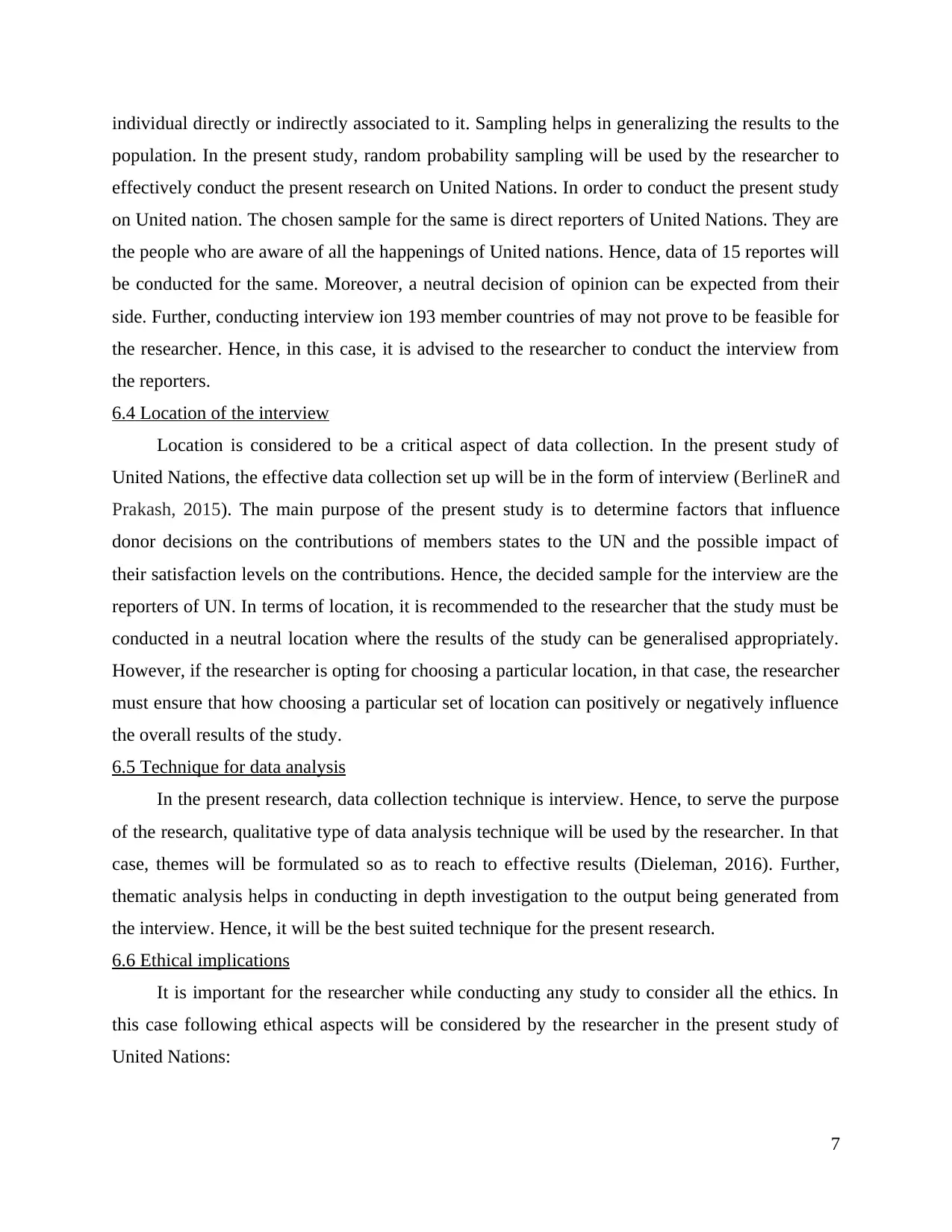
individual directly or indirectly associated to it. Sampling helps in generalizing the results to the
population. In the present study, random probability sampling will be used by the researcher to
effectively conduct the present research on United Nations. In order to conduct the present study
on United nation. The chosen sample for the same is direct reporters of United Nations. They are
the people who are aware of all the happenings of United nations. Hence, data of 15 reportes will
be conducted for the same. Moreover, a neutral decision of opinion can be expected from their
side. Further, conducting interview ion 193 member countries of may not prove to be feasible for
the researcher. Hence, in this case, it is advised to the researcher to conduct the interview from
the reporters.
6.4 Location of the interview
Location is considered to be a critical aspect of data collection. In the present study of
United Nations, the effective data collection set up will be in the form of interview (BerlineR and
Prakash, 2015). The main purpose of the present study is to determine factors that influence
donor decisions on the contributions of members states to the UN and the possible impact of
their satisfaction levels on the contributions. Hence, the decided sample for the interview are the
reporters of UN. In terms of location, it is recommended to the researcher that the study must be
conducted in a neutral location where the results of the study can be generalised appropriately.
However, if the researcher is opting for choosing a particular location, in that case, the researcher
must ensure that how choosing a particular set of location can positively or negatively influence
the overall results of the study.
6.5 Technique for data analysis
In the present research, data collection technique is interview. Hence, to serve the purpose
of the research, qualitative type of data analysis technique will be used by the researcher. In that
case, themes will be formulated so as to reach to effective results (Dieleman, 2016). Further,
thematic analysis helps in conducting in depth investigation to the output being generated from
the interview. Hence, it will be the best suited technique for the present research.
6.6 Ethical implications
It is important for the researcher while conducting any study to consider all the ethics. In
this case following ethical aspects will be considered by the researcher in the present study of
United Nations:
7
population. In the present study, random probability sampling will be used by the researcher to
effectively conduct the present research on United Nations. In order to conduct the present study
on United nation. The chosen sample for the same is direct reporters of United Nations. They are
the people who are aware of all the happenings of United nations. Hence, data of 15 reportes will
be conducted for the same. Moreover, a neutral decision of opinion can be expected from their
side. Further, conducting interview ion 193 member countries of may not prove to be feasible for
the researcher. Hence, in this case, it is advised to the researcher to conduct the interview from
the reporters.
6.4 Location of the interview
Location is considered to be a critical aspect of data collection. In the present study of
United Nations, the effective data collection set up will be in the form of interview (BerlineR and
Prakash, 2015). The main purpose of the present study is to determine factors that influence
donor decisions on the contributions of members states to the UN and the possible impact of
their satisfaction levels on the contributions. Hence, the decided sample for the interview are the
reporters of UN. In terms of location, it is recommended to the researcher that the study must be
conducted in a neutral location where the results of the study can be generalised appropriately.
However, if the researcher is opting for choosing a particular location, in that case, the researcher
must ensure that how choosing a particular set of location can positively or negatively influence
the overall results of the study.
6.5 Technique for data analysis
In the present research, data collection technique is interview. Hence, to serve the purpose
of the research, qualitative type of data analysis technique will be used by the researcher. In that
case, themes will be formulated so as to reach to effective results (Dieleman, 2016). Further,
thematic analysis helps in conducting in depth investigation to the output being generated from
the interview. Hence, it will be the best suited technique for the present research.
6.6 Ethical implications
It is important for the researcher while conducting any study to consider all the ethics. In
this case following ethical aspects will be considered by the researcher in the present study of
United Nations:
7
⊘ This is a preview!⊘
Do you want full access?
Subscribe today to unlock all pages.

Trusted by 1+ million students worldwide
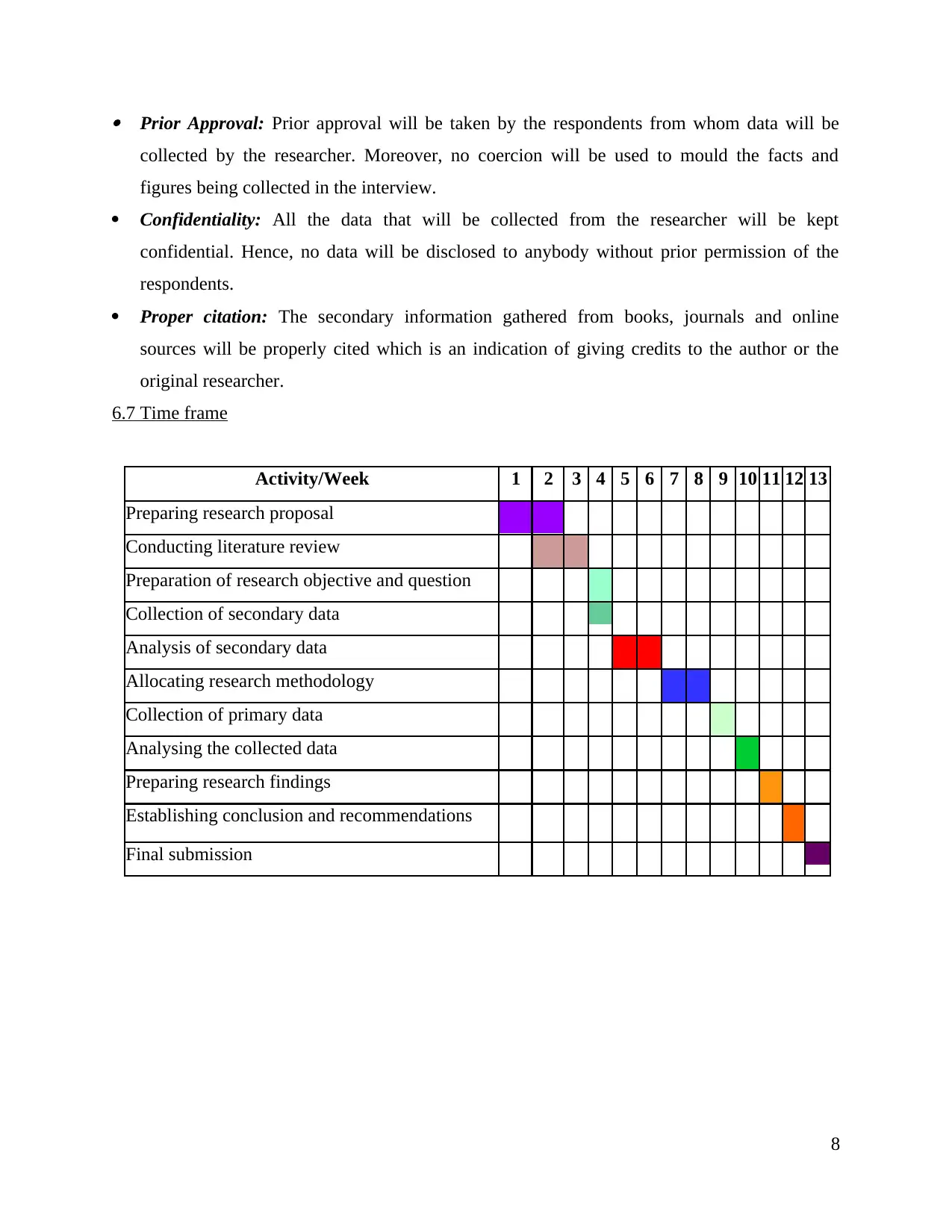
Prior Approval: Prior approval will be taken by the respondents from whom data will be
collected by the researcher. Moreover, no coercion will be used to mould the facts and
figures being collected in the interview.
Confidentiality: All the data that will be collected from the researcher will be kept
confidential. Hence, no data will be disclosed to anybody without prior permission of the
respondents.
Proper citation: The secondary information gathered from books, journals and online
sources will be properly cited which is an indication of giving credits to the author or the
original researcher.
6.7 Time frame
Activity/Week 1 2 3 4 5 6 7 8 9 10 11 12 13
Preparing research proposal
Conducting literature review
Preparation of research objective and question
Collection of secondary data
Analysis of secondary data
Allocating research methodology
Collection of primary data
Analysing the collected data
Preparing research findings
Establishing conclusion and recommendations
Final submission
8
collected by the researcher. Moreover, no coercion will be used to mould the facts and
figures being collected in the interview.
Confidentiality: All the data that will be collected from the researcher will be kept
confidential. Hence, no data will be disclosed to anybody without prior permission of the
respondents.
Proper citation: The secondary information gathered from books, journals and online
sources will be properly cited which is an indication of giving credits to the author or the
original researcher.
6.7 Time frame
Activity/Week 1 2 3 4 5 6 7 8 9 10 11 12 13
Preparing research proposal
Conducting literature review
Preparation of research objective and question
Collection of secondary data
Analysis of secondary data
Allocating research methodology
Collection of primary data
Analysing the collected data
Preparing research findings
Establishing conclusion and recommendations
Final submission
8
Paraphrase This Document
Need a fresh take? Get an instant paraphrase of this document with our AI Paraphraser
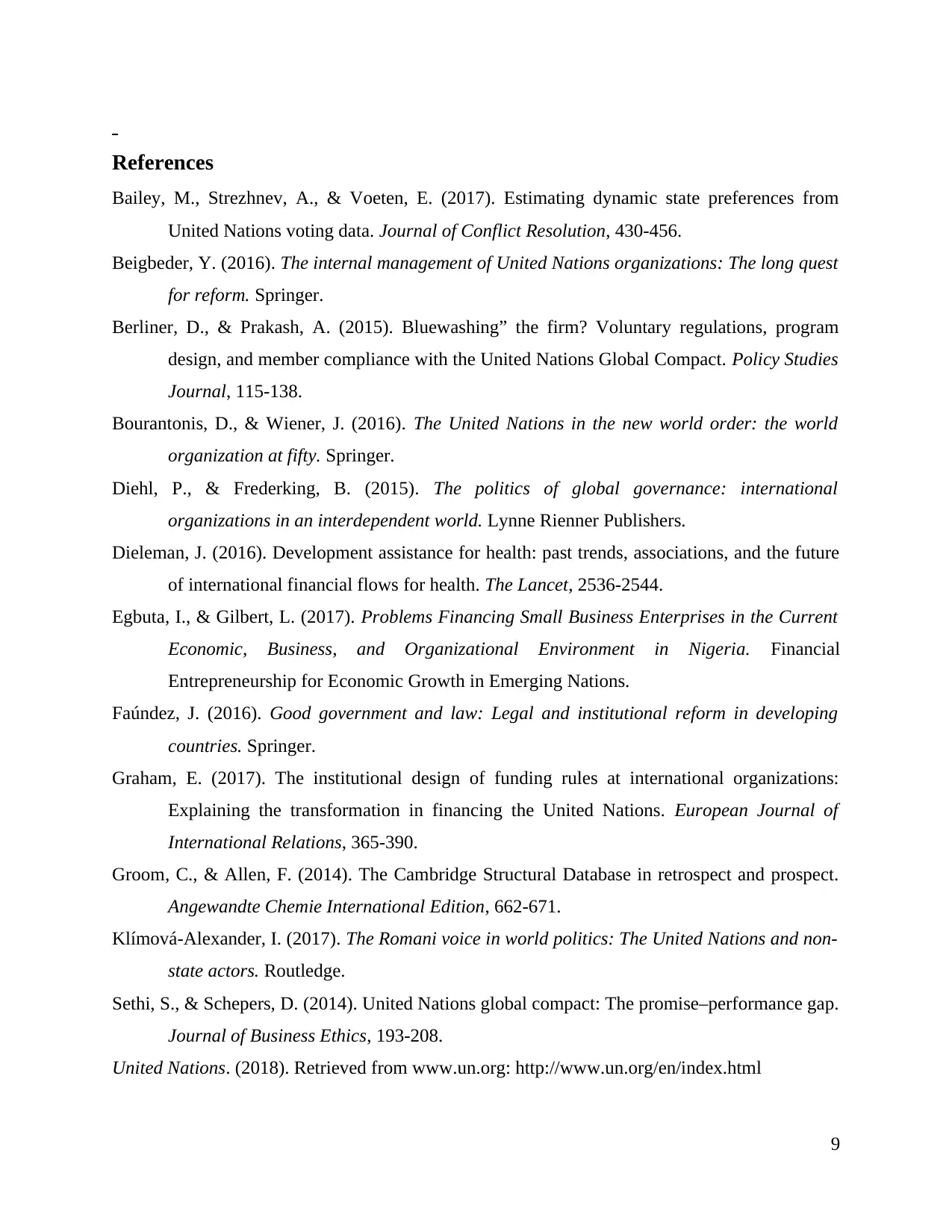
References
Bailey, M., Strezhnev, A., & Voeten, E. (2017). Estimating dynamic state preferences from
United Nations voting data. Journal of Conflict Resolution, 430-456.
Beigbeder, Y. (2016). The internal management of United Nations organizations: The long quest
for reform. Springer.
Berliner, D., & Prakash, A. (2015). Bluewashing” the firm? Voluntary regulations, program
design, and member compliance with the United Nations Global Compact. Policy Studies
Journal, 115-138.
Bourantonis, D., & Wiener, J. (2016). The United Nations in the new world order: the world
organization at fifty. Springer.
Diehl, P., & Frederking, B. (2015). The politics of global governance: international
organizations in an interdependent world. Lynne Rienner Publishers.
Dieleman, J. (2016). Development assistance for health: past trends, associations, and the future
of international financial flows for health. The Lancet, 2536-2544.
Egbuta, I., & Gilbert, L. (2017). Problems Financing Small Business Enterprises in the Current
Economic, Business, and Organizational Environment in Nigeria. Financial
Entrepreneurship for Economic Growth in Emerging Nations.
Faúndez, J. (2016). Good government and law: Legal and institutional reform in developing
countries. Springer.
Graham, E. (2017). The institutional design of funding rules at international organizations:
Explaining the transformation in financing the United Nations. European Journal of
International Relations, 365-390.
Groom, C., & Allen, F. (2014). The Cambridge Structural Database in retrospect and prospect.
Angewandte Chemie International Edition, 662-671.
Klímová-Alexander, I. (2017). The Romani voice in world politics: The United Nations and non-
state actors. Routledge.
Sethi, S., & Schepers, D. (2014). United Nations global compact: The promise–performance gap.
Journal of Business Ethics, 193-208.
United Nations. (2018). Retrieved from www.un.org: http://www.un.org/en/index.html
9
Bailey, M., Strezhnev, A., & Voeten, E. (2017). Estimating dynamic state preferences from
United Nations voting data. Journal of Conflict Resolution, 430-456.
Beigbeder, Y. (2016). The internal management of United Nations organizations: The long quest
for reform. Springer.
Berliner, D., & Prakash, A. (2015). Bluewashing” the firm? Voluntary regulations, program
design, and member compliance with the United Nations Global Compact. Policy Studies
Journal, 115-138.
Bourantonis, D., & Wiener, J. (2016). The United Nations in the new world order: the world
organization at fifty. Springer.
Diehl, P., & Frederking, B. (2015). The politics of global governance: international
organizations in an interdependent world. Lynne Rienner Publishers.
Dieleman, J. (2016). Development assistance for health: past trends, associations, and the future
of international financial flows for health. The Lancet, 2536-2544.
Egbuta, I., & Gilbert, L. (2017). Problems Financing Small Business Enterprises in the Current
Economic, Business, and Organizational Environment in Nigeria. Financial
Entrepreneurship for Economic Growth in Emerging Nations.
Faúndez, J. (2016). Good government and law: Legal and institutional reform in developing
countries. Springer.
Graham, E. (2017). The institutional design of funding rules at international organizations:
Explaining the transformation in financing the United Nations. European Journal of
International Relations, 365-390.
Groom, C., & Allen, F. (2014). The Cambridge Structural Database in retrospect and prospect.
Angewandte Chemie International Edition, 662-671.
Klímová-Alexander, I. (2017). The Romani voice in world politics: The United Nations and non-
state actors. Routledge.
Sethi, S., & Schepers, D. (2014). United Nations global compact: The promise–performance gap.
Journal of Business Ethics, 193-208.
United Nations. (2018). Retrieved from www.un.org: http://www.un.org/en/index.html
9
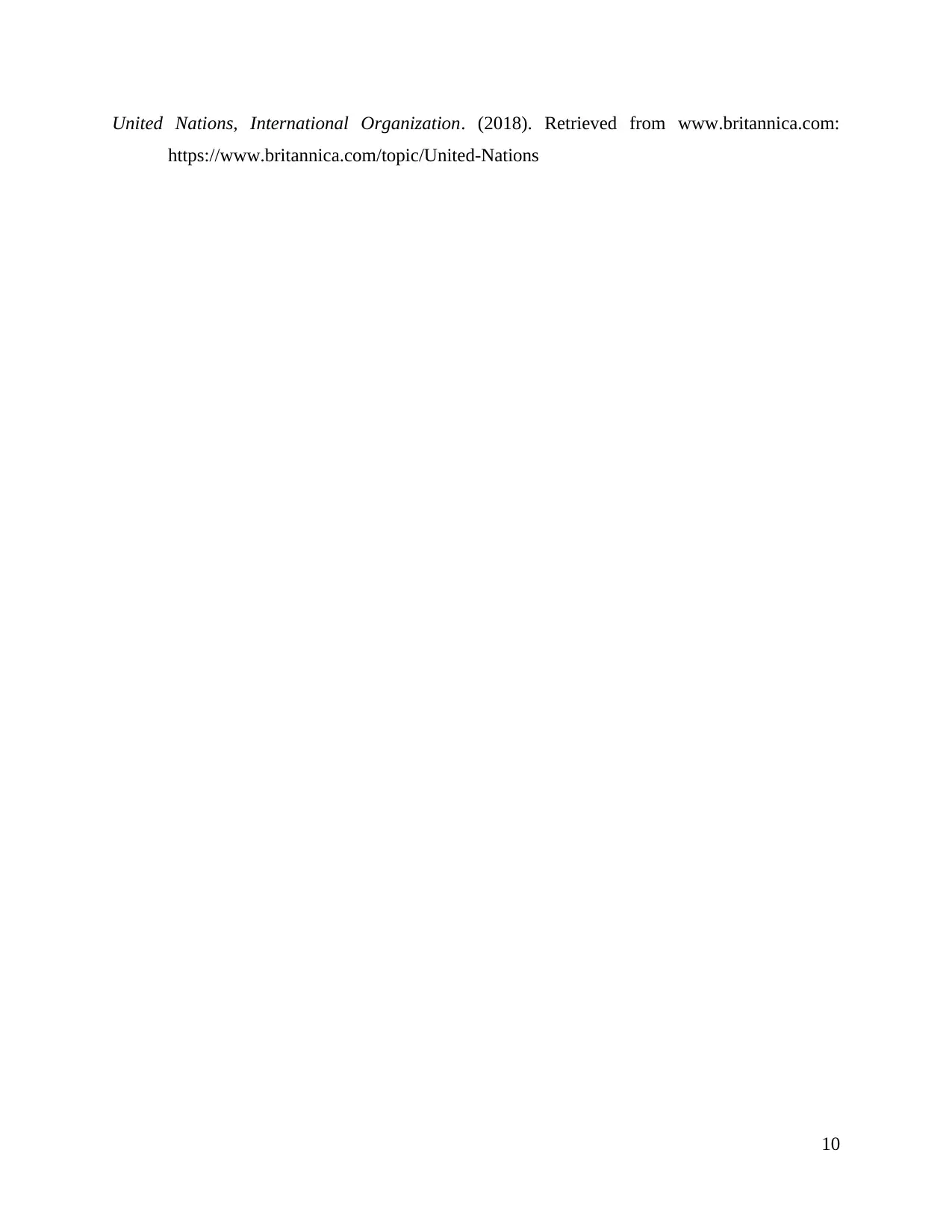
United Nations, International Organization. (2018). Retrieved from www.britannica.com:
https://www.britannica.com/topic/United-Nations
10
https://www.britannica.com/topic/United-Nations
10
⊘ This is a preview!⊘
Do you want full access?
Subscribe today to unlock all pages.

Trusted by 1+ million students worldwide
1 out of 12
Related Documents
Your All-in-One AI-Powered Toolkit for Academic Success.
+13062052269
info@desklib.com
Available 24*7 on WhatsApp / Email
![[object Object]](/_next/static/media/star-bottom.7253800d.svg)
Unlock your academic potential
Copyright © 2020–2026 A2Z Services. All Rights Reserved. Developed and managed by ZUCOL.




